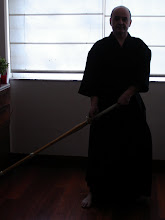The Japanese martial sword art of iaido has been bloodied by a bribery scandal in which candidates paid cash to judges presiding over their rank promotion tests. Iaido is a martial art that focuses on mental presence and immediate reaction, emphasizing being aware and capable of quickly drawing a sword and responding to a sudden attack.
Iaido, like other martial arts, has a ranking system. The dan range from sho-dan (first dan) to hachi-dan (eighth dan). In addition, there is a shogo title system consisting of three ranks: renshi, kyoshi and hanshi (the highest). Only those who hold a sixth-dan or higher rank can apply for the three shogo titles, which recognize the applicant's technical and mental levels of achievement as well as their teaching ability and insights. The promotion test for eighth dan is held twice a year and the hanshi test once a year. Both are extremely difficult, with only a few candidates passing.
According to the All Japan Kendo Federation (AJKF) investigation, a "vicious practice" existed in which bribes were exchanged between candidates and judges or other people involved with their promotion tests to the top ranks. The bribery scandal that wounded the iaido department of the kendo federation surfaced after a candidate who was due to take a promotion exam submitted a complaint to the Cabinet Office’s Public Interest Corporation Commission in June. The complaint said that people involved with the promotion test demanded cash in exchange for awarding the shogo rank that he sought.
In response to those accusations, the AJKF investigated judges, members of the iaido committee and other people involved. Although the AJKF failed to identify concrete evidence of bribes apart from the 2012 and the 2016 cases, the federation determined “the inappropriate ‘vicious practice’ of bribe money exchanging hands between (the candidates and judges or other people involved with the promotion test) implemented in the time prior to the test" based on verbal evidence.
More info at: http://www.asahi.com/ajw/articles/AJ201808170047.html




No hay comentarios:
Publicar un comentario